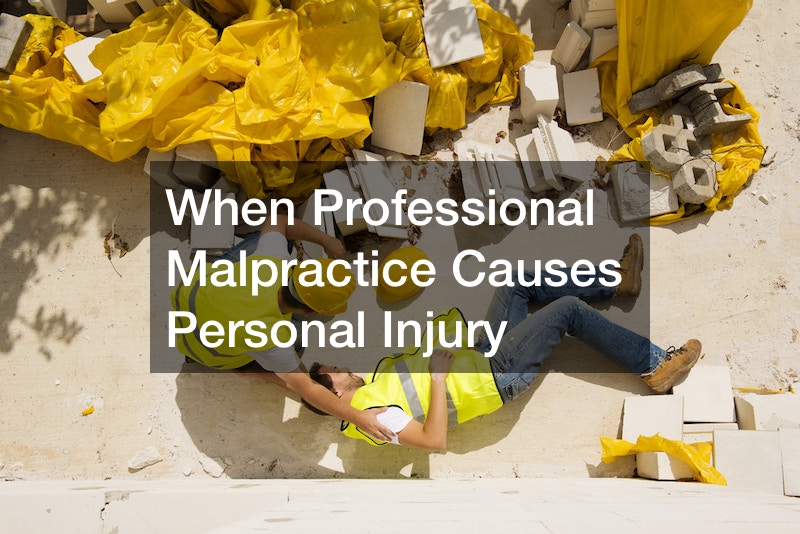Everybody experiences issues at their job every once in a while, but if these concerns have resulted in a personal injury, you could be entitled to a lucrative sum of compensation. If you’ve suffered an injury at work such as a serious fall or have come in contact with an infectious disease, you may be left feeling angry and confused. For those that relate to this situation, you should contact an injury attorney as soon as possible.

These professionals are well-versed in the world of professional malpractice, so they are more than capable of taking your case further than just personal injury law 101. Plus, these attorneys can offer a wealth of advice and guidance, especially when it comes to personal injury arbitration and supplying evidence to the courts. Therefore, you can rest assured knowing that you’ve got the right team to help you find justice in your case.
As such, this article will explore everything you need to know about selecting the right attorney for your situation as well as the intricacies of personal injury assist. We will also provide an informative personal injury lawyer FAQ to help answer some of your most burning questions.
A personal injury attorney (Or PI attorney for short) is a lawyer dedicated to injuries caused by negligence or accidents at the workplace. You should contact a professional personal injury lawyer if you had an accident that you weren’t responsible for and need compensation to pay for medical bills and other personal injury topics.
The Help You Deserve

Dealing with an injury can be stressful and expensive. Moreover, with the personal injury assist of a lawyer, you can find the funds to pay for your expenses while doing justice and making meaningful changes, so your accident can never happen again.
Learning About Personal Injury

As with most law-related topics, personal injury is complicated and hard to understand. Moreover, to learn the personal injury law 101 tips, you should talk with your lawyer and let them explain what you should know about your case. Whether you want to understand the importance of personal injury arbitration or where your case is heading, it’s best to leave a professional to teach you everything step-by-step.
Your safety doesn’t have a price tag. Hire a personal injury lawyer as soon as you have an accident and let them handle everything for you.
Suffering from a personal injury is something that could happen to anyone, given the wide range of situations under which personal injuries can happen. If you or someone that you know is ever involved in a personal injury, the first step to take is to hire a professional. This includes auto accident attorneys, who are adept at handling permanent injuries that take place on the road or elsewhere and involve a car.
To be in the best position to find the perfect lawyer, you may want to do some research. This is easy enough as you can just search online to see what personal injury law entails. When you’re aware of a few personal injury topics, you may be in a position to figure out the details of your own case. You can also keep up with the steps that the process entails, something that could make it easier for you to go on with your life as usual, at least to some extent.

Depending on the specifics of your case, such as whether you got injured to the extent of permanent damage, you might have to rely quite heavily on your lawyer. This makes it even more important to hire the best person for the job. Don’t forget to learn what a personal injury affidavit is, as well as whether your professional should give you one.
When people think about injuries, they usually imagine accidents, traumas, and other unexpected situations. Most don’t think about the possibility of being harmed while getting professional help. Unfortunately, it happens, and you’ll have to search personal injury law firms to find the best attorney. Malpractice is a big deal, and you shouldn’t be affected because someone else made a mistake.

Any negligence, error in judgment, or misconduct should have consequences for the professional who was provided his or her services. That’s part of personal injury law 101 and one of the main hot topics in personal injury law. A lawyer will take a look at your case and come up with a solution, which often means financial compensation.
In the most extreme cases, the professional can lose their license to practice their particular field, like medicine, law, or accounting. If you’re injured to extent of permanent damage, the person could be charged with crime later. However, it’ll all depend on the situation and what happens in court after you file a malpractice lawsuit. This area is tricky, which is why you must take it seriously and hire a great lawyer. Let’s find out more about this matter and other personal injury topics.

Injured at work and wondering if you should get an attorney? You should, right away. The litigation process personal injury representative best suited for this is a work injury attorney. It’s possible to have multiple significant injuries close together, so you have several ongoing injuries simultaneously.
You’ll need an attorney to be the one handling personal injury claims on your behalf since they can be messy and complicated. Did you know that overwork, bullying, and harassment in the workplace can result in psychiatric injury? You should also know that you can lodge a claim for work-related stress.
Several parties are involved in workers comp; you, the injured worker, your employer, attorney, adjusters, and doctors. Here’s a personal injury law 101: communicate with each of them, so you’re on the same page and document everything.
One of the concerns you may have, which is pretty common with personal injury claims, is if by filing a workers comp or hiring a lawyer will cause you lose your job. It depends on your employer; some are difficult, want to evade payments, and will look for grounds to dismiss you. So, be careful and play by the book. If you have days off, get a doctor’s note as evidence of your injury. Work-related injuries are the most researched personal injury topics, meaning there are a lot of resources available, so get as much information as you can. You should get all the benefits you are entitled to.
Sadly, many people get hurt every day. In some cases, the incident was completely unintentional and no one did anything wrong. However, it’s also possible that malpractice or neglect was involved. If that’s the case, consulting an attorney is a must. Personal injury victims who suffered owing to someone else’s mistakes are often entitled to compensation.
Personal injuries can happen pretty much anywhere. That said, in some environments, personal injuries may be more common. For example, a lot of people suffer from work-related injuries. Often, these injuries are because the employer failed to prioritize safety.
Thankfully, a work injury attorney can help victims receive compensation. This way, the injured can pay for medical bills and also make up for lost income. This may seem like personal injury law 101, but in practice many folks don’t know their rights.

If you or a loved one are in need of an attorney, it’s smart to ask for personal injury quotes. Also, pay attention to personal injury lawyer reputation and find an attorney who prioritizes clients. Keep in mind, however, that many lawyers dealing with injuries and civil suits will work on contingency. This means the injured party only needs to pay if and when a court case is won.
Every legal situation is different. All the details of personal injury cases can certainly vary just as much. Some personal injury victims got hurt because of the actions of a professional of some kind. It’s relatively common for that to happen in a medical setting. People can also get those sorts of injuries at work. Even when people visit certain commercial buildings more causally than that, they might still be harmed if the people who are maintaining or operating in that space are negligent enough.

A personal injury attorney can work to determine if someone actually did get hurt because a third party was careless in some way. It’s certainly possible that the personal injury causes of action were relevant to this part of the law. No one should make any assumptions about personal injury law 101. If you’ve paid attention to the personal injury lawyer reputation of the individual that you’ve sought out, they’ll have enough familiarity with everything connected to your situation.
The personal injuries themselves may or may not heal. A person’s financial losses could be more or less severe than the actual injuries. A lawyer can help with all these problems and more.

It’s hard to imagine suffering more while getting professional assistance, but it happens. It’s called malpractice, and if you suffer an injury because of an error, you could need a personal injury lawyer. No one wants to deal with legalities and court dates most of the time, but you should consider filing a claim.

Malpractice can happen in any field, although you might be more familiar with medical malpractice, for example. However, it can happen to a factory worker due to some mismanagement of equipment by other parties. That’s part of personal injury law 101, and an attorney will be able to help you understand exactly what you can do in that situation.
A person with a fantastic personal injury lawyer reputation will explain your options, and they’ll also be honest with you. Sometimes, what you think was professional malpractice might not be so, and only your lawyer will be honest about that. However, they’ll review the personal injury causes of action, determine if you can file a lawsuit, and proceed with your case. The point is to get compensation for the pain, emotional distress, medical bills, etc. Many personal injury victims don’t want to sue, but it’s important to understand why they should.
Let’s find out more about malpractice leading to personal injuries.

If you have suffered from a personal injury, you may have a case that needs to go through court. There are many ways that an injury attorney can help you with your case. Often, there are one or more insurance companies involved in the case, and your attorney will work with those companies to try to get you a settlement for your injury. They can tell you whether you have a personal injury claim.

After you have had an accident body injury, you may need plenty of time to heal. This can mean that you lose out on wages during that time. Often, accident body injury cases involved legal costs, lost wages, and all of the medical and therapy bills. To get a settlement that reflects all of these costs, you need an attorney who understands accident case law. They can then help with getting accident compensation claims into court.
It’s helpful to have an attorney in your corner who understands the complicated nature of accidents and injuries. Make sure that you have a good attorney on your side to help you through the case from start to finish. You will then have someone to ask all of your legal questions.

Personal injury law itself is complex. People can file a personal injury claim for multiple reasons. Some individuals will have to hire an automobile injury attorney to help them with the case. These attorneys will be less helpful in the case of an accident or body injury that wasn’t caused by a vehicle. There are some common factors involved with accident case law, however.
Individuals may get similar accident compensation claims in vastly different cases. If they’re able to demonstrate that the accident can be attributed to one person being negligent, then getting some compensation should be possible. Legal attorneys have to be realistic about the level of compensation that any of their clients will be able to receive. Still, they’ll focus on determining how injured their clients have become as a result of what happened.

Getting injured as a result of medical mistakes is common enough that doctors have to specifically purchase malpractice insurance. Many professional organizations have similar types of insurance now as well. These insurance companies are usually prepared for a wide range of personal injury cases.
Patients can consult with specific personal injury attorneys. They may or may not have worked with these exact same professionals in the past.
When you have been injured by an accident, you need a personal injury attorney to file a personal injury claim and try to get you what you need for your injury. A good personal injury lawyer will be able to assess the situation and know just how to proceed to try to get you a settlement for the accident. In some areas, this includes some for pain and suffering while that isn’t generally granted in others.
Having a personal injury attorney at your side means that every step of the process will be completed correctly so that you can proceed with your case. A personal injury lawyer is experienced with different types of personal injuries so they can help with a variety of injury cases. Make sure your attorney is well-versed in personal injury law as well as the local area before you hire them.

It can be helpful to go to online sites that have reviews of local lawyers to make your choice easier. Look for an attorney who has good reviews and is generally said to be helpful and often successful in their cases. You can find these reviews in the business listings on your favorite search engine.
Doctors, lawyers, accountants, and other professionals have high standards of care toward their clients. The relationship is based on trust, and negligence may entitle the client to an accidental bodily injury claim. However, many people are unaware of how to file a claim against a professional. This trust is essential, and it can be difficult to prove negligence without a personal injury attorney in a case of malpractice resulting in personal injury. If you feel aggrieved, you need the help of a personal injury lawyer.

The personal injury lawyer will help you file a lawsuit against any negligent professional who fails to meet the standards of care set by their profession. It can include any medical mistake or error that causes harm to the patient. For example, if a doctor fails to diagnose cancer and it spreads throughout the body because of this failure, the doctor has committed professional malpractice. It can be difficult to know the next steps if you are hurt in an accident. You may have questions about your medical care, and the best solution is to get an attorney with experience in accident case law.
Similarly, if a lawyer fails to file documents on time or misses deadlines in other ways, they may be committing professional malpractice against the client.

The number one type of personal injury case seen in the U.S. are those stemming from accidents involving cars, trucks, and motorcycles. A vast majority never see trial, with 90% to 95% being settled pretrial. Sometimes, however, these personal injury cases cross the line into other areas of tort law, such as professional malpractice.
Like most personal injury cases, professional malpractice claims often rely on a legal concept of negligence to prove the fault of the defendant. For a jury to determine if an individual in a personal injury case or professional malpractice suit is guilty of negligence, it must first be established that the defendant had a duty of care and then breached that duty.
In legalese, duty of care is used to refer to an individual’s responsibility to avoid harming or causing harm to another individual. To demonstrate a negligence of this duty of care, then, one must first prove that the defendant had a duty of care to begin with. This is easier to do with personal injury litigation that involves professional malpractice as duty of care is higher for a professional than it is for an average citizen.
In general, a professional’s duty of care is such that would be exercised by a reasonably prudent professional in the field. For instance, a pharmacist may be found guilty of pharmaceutical malpractice if he made an error in filling a prescription which then caused harm to the patient. Likewise, a construction worker could be at fault of professional malpractice if he failed to remove hazardous equipment from the road, leading to a motor vehicle accident. Alternatively, the manufacturer of construction equipment has product liability if his equipment malfunctioned while being used by a construction worker and thus caused either the worker or nearby drivers harm. A professional malpractice and personal injury claim could be brought against this manufacturer for the injuries incurred.
For non-professionals, there is still a duty of care to be upheld. A driver has a responsibility to take reasonable care while operating his motor vehicle. This responsibility includes obeying traffic laws and having awareness of traffic and weather conditions. With state laws governing driving conduct, if one driver was in clear violation of the law, it’s generally the case that he also breached his legal duty of care.
Other types of duty of care breaches that could result in a personal injury or professional malpractice suit could include a property owner who has failed to keep his premises free of hazards that results in a slip and fall injury. A common type of professional malpractice is medical malpractice. If a medical professional fails to treat a patient with the level of care and expertise expected of a reasonably competent professional in her role, she may have breached her duty of care.
Medical malpractice could result in not only bodily personal injury but also financial personal harm from extraneous medical bills. Over 60% of all cases involving personal bankruptcy were due to medical expenses. Other common types of professional malpractice that may or may not cause personal injury include broker malpractice, often from not taking prudent care when acting under his fiduciary responsibility to his client, accounting malpractice, such as from being negligent or careless in the preparation of financial documents, and legal malpractice caused by a failure to abide by the code of ethics or failure to appear on the client’s behalf.
Once duty of care has been established, the next step is determining fault. Establishing a breach of duty of care falls to the plaintiff and his or her attorney. It may be that the plaintiff’s actions played a part in causing her injuries. As such, in most states, her total compensation from the personal injury case will be reduced in accordance with the degree in which her actions were at fault. Other states provide for contributory negligence, in which case any degree of fault on the part of the plaintiff would render her unable to collect damages at all.
The final step to demonstrating negligence is to show the harm incurred by the plaintiff was caused by the defendant’s breach of duty of care. At which point, the personal injury or professional malpractice claim should be demonstrated.






